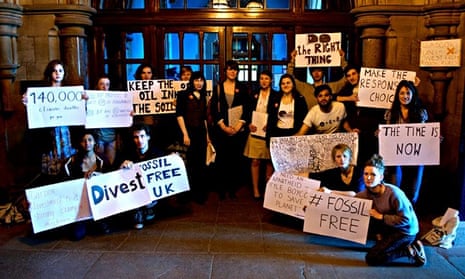Glasgow University has become the first academic institution in Europe to divest from the fossil fuel industry, in a turning point for the British arm of the student-led global divestment movement.
After 12 months of campaigning, led by the Glasgow University Climate Action Society and involving over 1,300 students, the university court on Wednesday voted to begin divesting £18m from the fossil fuel industry and freeze new investments across its entire endowment of £128m.
Describing the result as “a dramatic beachhead for the divestment movement”, American environmentalist Bill McKibben said that it sent a powerful signal that Europe would be “just as powerful in this fight as Australia and North America”.
The founder of climate campaign group 350.org added: “That it comes from Glasgow, which has as much claim to birthing the industrial revolution as any city on Earth, makes it that much more special. Everyone from the Rockefellers on down is realising it’s time to move on.”
As of last month, more than 800 global investors – including foundations such as the Rockefeller Brothers, religious groups, healthcare organisations, universities and local governments – have pledged to withdraw a total of $50bn (£31bn) from fossil fuel investments over the next five years as a result of the campaign which began on college campuses in the United States three years ago.
Writer and activist Naomi Klein said that Glasgow University had joined “a fast-growing global movement providing much-needed hope to the prospect of climate action.”
“Students around the world are making it clear that the institutions entrusted to prepare them for the future cannot simultaneously bet against their future by profiting from corporations that plan to burn many times more carbon than our atmosphere can safely absorb,” said Klein.
“They are sending an unequivocal message that fossil fuel profits are illegitimate – on par with tobacco and arms profits – and that brings us a significant step closer to demanding that our politicians sever ties with this rogue industry and implement bold climate policies based on a clear, progressive ‘polluter pays’ principle.’”
Glasgow University joins thirteen US universities, including Stanford, which have already committed to divest from the fossil fuel industry. In the UK, student unions at Imperial College and University College, London, are demanding that their institutions take similar action. The School of Oriental and African Studies (SOAS), at the University of London, has agreed to a temporary freeze on investment in advance of a decision on full divestment to be taken later this year.
Decisions are also imminent from the University of Edinburgh, which conducted a staff and student consultation that was overwhelmingly in support of divestment. Oxford University and its colleges, which have an endowment wealth of £3.8bn, the largest of any higher education institution in the UK, is currently conducting a staff-only consultation, after almost 2,000 students and academics joined a campaign calling for divestment.
Andrew Taylor of the People and Planet Network, which has launched over fifty ‘Fossil Free’ campaigns across the UK involving over 15,000 students in the past year, said: “Divestment now has a firm foothold in the UK. Student and academic pressure to get out of fossil fuels is building across the sector. It’s time to stop profiting from wrecking the climate, whether you’re an institution with lots of money like Oxford or Edinburgh, or a world leader in climate research such as the University of East Anglia. Glasgow has helped make the moral case crystal clear and we expect more universities to very soon put their money where their research is.”
Founded in 2011 across just half a dozen US college campuses, the fossil fuel divestment movement has gained remarkable traction over a relatively short period of time. A study by Oxford University last autumn found that it had grown faster than any previous divestment campaign, including those relating to apartheid, armaments and tobacco.
The campaign has recently enjoyed a succession of symbolic boosts.
Last month, the heirs to the Rockefeller oil fortune announced that they were withdrawing funds from fossil fuel investments and in July the World Council of Churches, which represents over half a billion Christians worldwide, decided to pull its investments out of fossil fuel companies.
Writing in the Guardian in April, Archbishop Desmond Tutu urged that “people of conscience need to break their ties with corporations financing the injustice of climate change”.








Comments (…)
Sign in or create your Guardian account to join the discussion